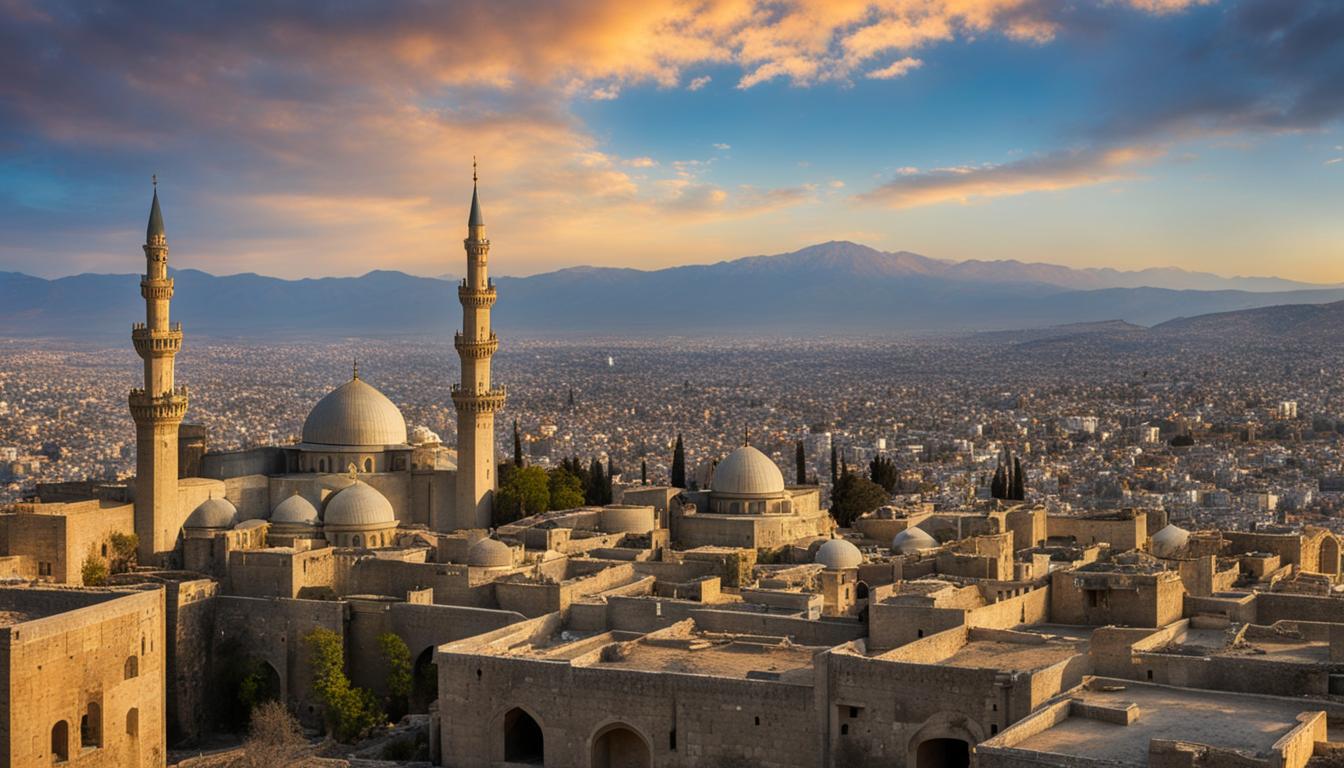Joppa, also known as Jaffa, is an ancient port city that holds significant biblical importance. Mentioned in both the Old and New Testaments, Joppa is considered one of the oldest cities in the world. Its strategic location at the crossroads of Israel and its role as a major port have made it a vital city throughout history. Today, Joppa continues to celebrate the events and stories recounted in the Bible, attracting visitors from around the world.
Key Takeaways:
- Joppa (Jaffa) is an ancient port city mentioned in the Bible’s Old and New Testaments.
- Its strategic location and role as a major port have made it historically significant.
- Joppa holds biblical references and plays a crucial role in Christian history.
- The city’s location in the Bible has attracted visitors to explore its historical context and embrace its significance in Christianity.
- Exploring Joppa offers a unique opportunity to delve into the rich biblical heritage and deepen one’s understanding of the faith.
Geographical Location of Joppa
Joppa, now known as Jaffa, is a city of significant historical and geographical importance. Located on the picturesque Mediterranean coast of modern-day Israel, Joppa’s coastal setting has played a vital role in shaping its rich history. Situated approximately 30 miles south of Caesarea and 40 miles northwest of Jerusalem, Joppa enjoys a strategic position between these prominent cities.
This ancient port city, steeped in biblical and cultural significance, rests within the bustling urban area of Tel Aviv. Its breathtaking cliff-side location offers stunning views of the shimmering sea, making it an enchanting destination for both locals and visitors alike.
Proximity to Caesarea and Jerusalem
Joppa’s proximity to nearby cities further enhances its prominence. Being just a short distance south of the ancient port city of Caesarea, Joppa enjoys close ties with this historic metropolis. Similarly, a mere 40 miles northwest of Jerusalem, Joppa offers a convenient connection to the heart of Israel’s capital city.
“Joppa, with its strategic location on the Mediterranean coast and its close proximity to Caesarea and Jerusalem, has played a significant role in the historical events and cultural tapestry of the region.” – Dr. Jacob Cohen, Archaeologist
Historical Significance of Joppa
Joppa, also known as Jaffa, holds immense historical significance due to its strategic location and role as an important port throughout ancient history. This ancient city has been inhabited by various civilizations over the centuries, including the Canaanites, Egyptians, Greeks, Romans, Crusaders, Ottomans, and British. It has witnessed countless historical events, making it a crossroads of cultures and civilizations.
The port of Joppa played a crucial role in facilitating trade and connecting different regions. It served as a vital link for the import and export of goods, making it a hub of economic activity and cultural exchange. The port’s significance can be traced back to biblical times, where it served as a gateway for the importation of wood during the construction of Solomon’s Temple.
Joppa’s historical significance extends beyond trade and commerce. It was a city of conquests, with renowned rulers such as Kings David and Solomon adding it to their empires. Joppa’s strategic location along the Mediterranean coast gave it a military advantage and made it an attractive target for ambitious rulers.
Throughout history, Joppa has witnessed the rise and fall of civilizations, the arrival of conquerors, and the ebb and flow of trade and cultural exchange.
A visit to Joppa allows us to step back in time and explore the rich tapestry of ancient history. The remnants of centuries past can still be found in the archaeological sites and historical landmarks that dot the city. From ancient ruins to preserved artifacts, Joppa offers a fascinating glimpse into the lives of the people who once inhabited this thriving port.
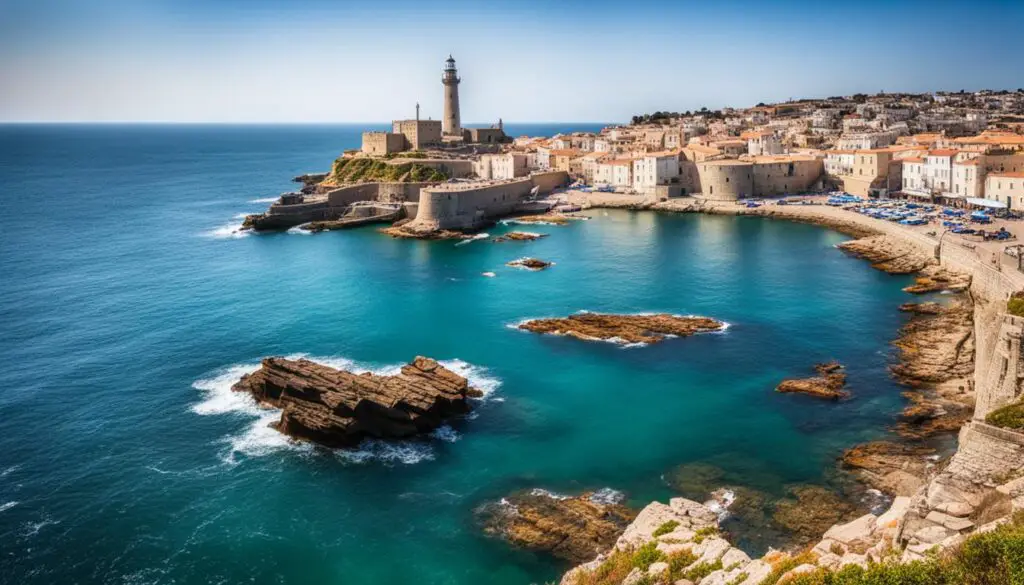
Key Points:
- Joppa played a critical role as an important port throughout ancient history.
- It has been inhabited by various civilizations, including the Canaanites, Egyptians, Greeks, Romans, Crusaders, Ottomans, and British.
- The port of Joppa facilitated trade and cultural exchange.
- Joppa witnessed historical events, including the importation of wood for Solomon’s Temple and the conquests of Kings David and Solomon.
Key Biblical Events in Joppa
Joppa, also known as Jaffa, holds a significant place in biblical history, being associated with several key events that shape the narrative of the Bible.
Jonah and the Whale
One of the most well-known biblical stories is that of Jonah and the Whale. Joppa is the city from which Jonah attempted to flee the command of God. His disobedience led to his encounter with a great fish, commonly referred to as a whale. Jonah was swallowed by the fish and spent three days and nights in its belly before being vomited out onto the shores of Joppa, where he ultimately fulfilled his mission.
“But the Lord provided a great fish to swallow Jonah, and Jonah was inside the fish for three days and three nights.”
– Book of Jonah 1:17 (NIV)
Simon the Tanner
Joppa is also the home of Simon the Tanner, an important biblical figure. The Apostle Peter stayed with Simon the Tanner while in Joppa, where he had a vision that challenged his understanding of Gentile inclusion in the early Christian community. This visionary experience paved the way for the acceptance and embrace of non-Jewish believers, expanding the reach of the Gospel.
Tabitha’s Resurrection
In Joppa, the disciple Tabitha, also known as Dorcas, lived a life dedicated to good works and acts of charity. When she fell ill and died, the believers in Joppa sent for Peter, who prayed over her and brought her back to life. This miraculous event further solidified the faith of the early Christians in Joppa and demonstrated the power of God at work.
These biblical events that unfolded in Joppa continue to be remembered and celebrated, as they exemplify themes of obedience, redemption, inclusivity, and the power of God’s miracles. They serve as valuable lessons and sources of inspiration for believers today.
Archaeological Discoveries in Joppa
Joppa, also known as Jaffa, holds a wealth of archaeological treasures that offer a glimpse into its rich history and ancient civilizations. From ancient monuments to historical artifacts, Joppa’s archaeological discoveries provide valuable insights into the lives, customs, and beliefs of the people who once inhabited this coastal city.
The archaeological excavations in Joppa have unearthed remarkable structures and artifacts dating back to various periods. These findings shed light on the city’s evolution and showcase the influences of different civilizations that have shaped its identity over time.
One of the most notable archaeological discoveries in Joppa is the Canaanite Gate, dating back to 1600-1300 B.C. This monumental structure stands as a testament to the city’s ancient origins and provides a window into the lives of its early inhabitants.
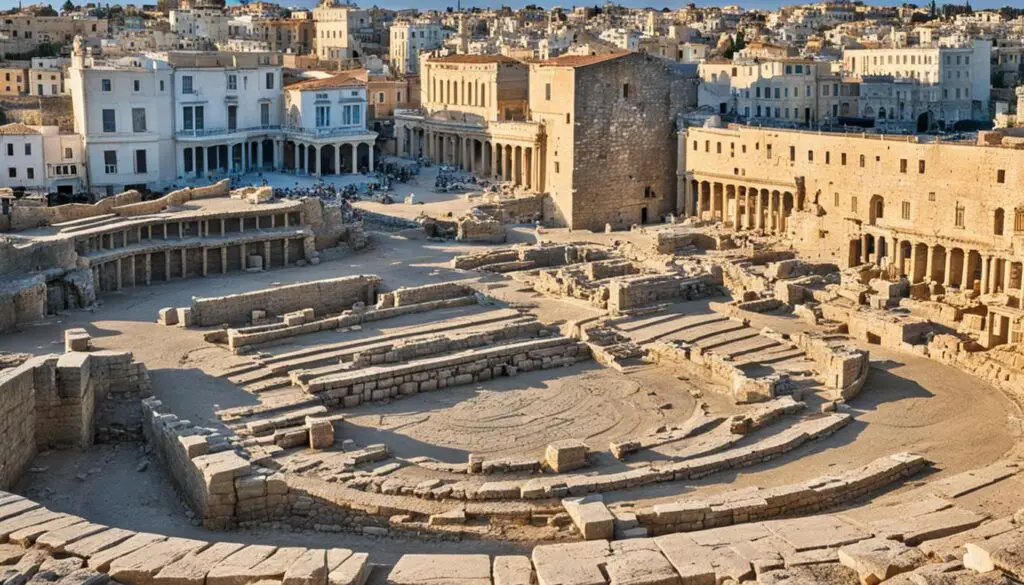
“The archaeological discoveries in Joppa transport us back in time, allowing us to visualize the daily routines and cultural practices of the people who once walked these streets. It’s like piecing together a puzzle of ancient life.” – Dr. Sarah Davis, Archaeologist
Excavations have also revealed Roman, Byzantine, and Crusader-era artifacts, showcasing the city’s importance as a trading hub and a site of cultural exchange throughout history. These artifacts range from amphorae used for transportation and storage to intricately designed jewelry and pottery.
Key Archaeological Discoveries in Joppa:
- 1. Canaanite Gate (1600-1300 B.C.): Remnants of a monumental entrance from Joppa’s ancient past.
- 2. Roman Amphitheater: A well-preserved amphitheater used for entertainment and theatrical performances.
- 3. Crusader Fortress: The remains of a fortress that once protected the city during the Crusader period.
- 4. Byzantine Mosaics: Intricate mosaics depicting scenes from daily life and religious motifs.
These archaeological discoveries not only contribute to our understanding of Joppa’s history but also provide valuable insights into the broader context of the ancient Mediterranean world. They serve as a testament to the significance of Joppa as a thriving and culturally diverse city throughout the ages.
Theological Themes in Joppa
Joppa, also known as Jaffa, holds profound theological themes and symbolic significance in the Bible. It serves as a vivid illustration of the consequences of disobedience and rebellion against God’s will. The story of Jonah, who tried to flee from his divine assignment, showcases Joppa as a place of defiance and the eventual realization of the need for obedience.
In addition to Jonah’s story, Joppa is significant in the early Christian community through the vision experienced by Peter. While staying in Joppa, Peter dreams of a sheet filled with unclean animals and hears a divine message that challenges his understanding of cleanliness and inclusion. This vision signifies the acceptance of Gentiles into the faith and highlights the spiritual significance of embracing diversity.
“And there came a voice to Peter: ‘Rise, Peter; kill, and eat.’” – Acts 10:13
These events in Joppa emphasize the themes of God’s sovereignty and mercy, reminding believers of the consequences of disobedience and the importance of aligning with God’s divine will. Furthermore, Joppa embodies the principles of inclusion, reflecting the spiritual significance of welcoming individuals from all walks of life into the Christian community.
By exploring Joppa’s theological themes, we gain a deeper understanding of the biblical narratives and the universal principles they convey.

Key Theological Themes in Joppa:
| Theological Themes | Symbolic Significance |
|---|---|
| Disobedience and Rebellion | Consequences of choosing to resist God’s will |
| Inclusion and Acceptance | Embracing diversity and expanding the boundaries of faith |
| God’s Sovereignty and Mercy | Affirming God’s authority and His compassion towards humanity |
Cultural and Religious Practices in Joppa
Joppa, now known as Jaffa, is a city that boasts a rich tapestry of cultural and religious diversity. It serves as a welcoming home to Christians, Jews, and Muslims, all of whom coexist harmoniously within its vibrant streets. Jaffa stands as a testament to the shared heritage of these religions, offering a glimpse into their respective cultural practices, religious traditions, and historical sites. Stepping foot in this multicultural city is like embarking on a journey through time, where the past and present intersect to create an enchanting atmosphere.
Jewish Heritage in Joppa
Joppa holds immense significance in Jewish heritage, with traces of Jewish presence dating back to antiquity. It is not only the birthplace of Tabitha, a revered disciple mentioned in the New Testament, but also home to the renowned Ark of the Covenant, which housed the stone tablets of the Ten Commandments during the time of the First Temple. Synagogues, Jewish cultural centers, and museums offer visitors the opportunity to delve into the rich Jewish history and experience the vibrant traditions that have been passed down through generations.
Christian Traditions in Joppa
For Christians, Joppa holds a special place as the setting for several significant biblical events. Peter’s vision at the home of Simon the Tanner, which led to the inclusion of Gentiles in the early Christian community, took place in Joppa. It is also where Peter raised Tabitha from the dead, showcasing the power of faith and miracles. Numerous churches and pilgrimage sites stand as testimony to these events and offer a place of worship and reflection for Christians from around the world.
Muslim Community in Joppa
Joppa is home to a vibrant Muslim community that adds to the cultural diversity of the city. The presence of mosques, Islamic centers, and vibrant marketplaces reflects the rich Islamic heritage within the fabric of Jaffa. Visitors have the opportunity to explore Muslim traditions, witness the call to prayer, and experience the warmth and hospitality that characterizes the Muslim community in Jaffa.
“Jaffa stands as a testament to the shared heritage of Christians, Jews, and Muslims, offering a glimpse into their respective cultural practices, religious traditions, and historical sites.”
The cultural and religious practices in Joppa/Jaffa are interwoven, creating a vibrant and dynamic atmosphere where individuals from different backgrounds and beliefs coexist harmoniously. The city radiates an inclusive spirit, inviting visitors to explore and appreciate the diverse range of traditions, customs, and historical landmarks that contribute to its enchanting allure.
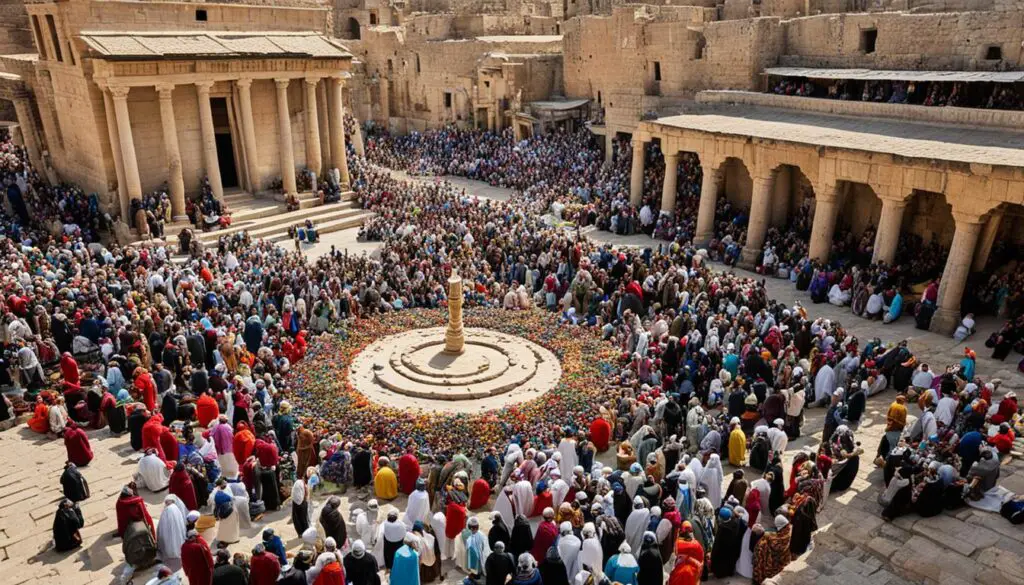
Prophetic and Eschatological Significance in Joppa
In the biblical narrative, Joppa (also known as Jaffa) holds profound prophetic and eschatological importance. This ancient port city’s association with pivotal biblical events and prophecies serves as a powerful reminder of God’s plans and promises.
One notable event that took place in Joppa is the well-known story of Jonah and the whale. Jonah’s attempt to flee from God’s command led him to Joppa, where he embarked on a fateful voyage, ultimately encountering a great sea creature. This event foreshadowed the expanding reach of the Gospel and the inclusivity of God’s salvation plan, as Jonah was finally obedient to his divine mission.
Furthermore, Joppa played host to another crucial event, namely Peter’s vision recorded in the Book of Acts. While staying in Joppa at the house of Simon the Tanner, Peter had a visionary experience on the rooftop, where he saw a sheet filled with unclean animals. This vision served as a profound revelation, signaling the inclusion of Gentiles in the early Christian community. It marked a significant shift in the trajectory of the Gospel message, highlighting God’s plan of salvation for all people.
These incidents in Joppa carry deep spiritual implications and continue to hold relevance for believers today. They symbolize the expansive nature of God’s redemptive work and his desire for all nations to be partakers of His grace. The significance of Joppa’s biblical prophecies extends beyond its historical context, resonating with eschatological hope and the ultimate fulfillment of God’s promises.
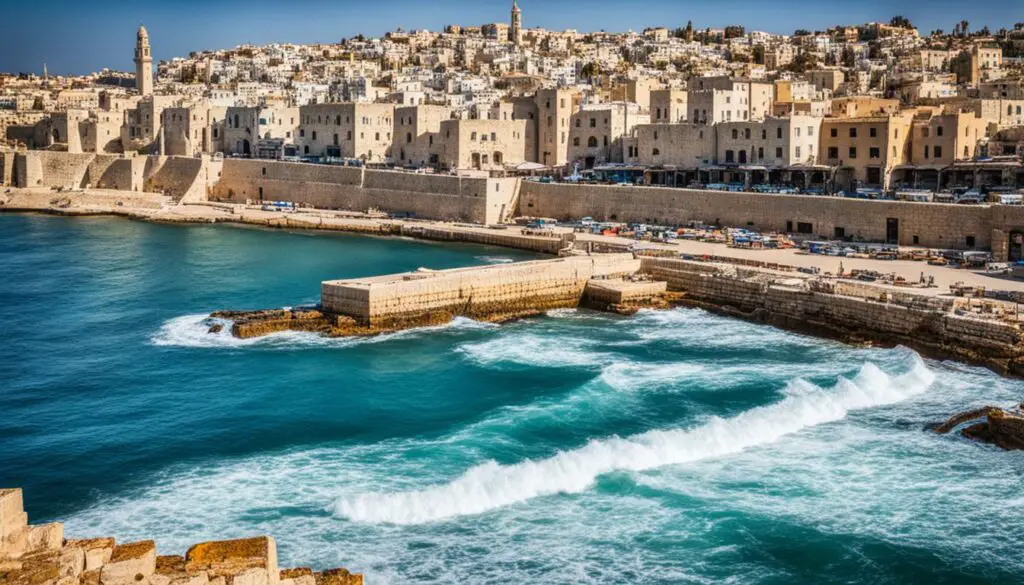
| Biblical Event | Significance |
|---|---|
| Jonah and the Whale | Foreshadowing of Gospel expansion and inclusivity |
| Peter’s Vision | Revelation of God’s plan to include Gentiles in salvation |
Conclusion
Joppa, also known as Jaffa, is a captivating ancient port city with a rich biblical heritage, historical significance, and a diverse cultural fabric. This unique destination attracts visitors from around the world, offering a profound encounter with timeless truths found in the Bible.
Throughout its storied past, Joppa has witnessed key biblical events, such as Jonah’s encounter with the whale and Peter’s vision. These events continue to inspire theological reflection and serve as reminders of God’s plans and promises. Joppa’s archaeological treasures, including ancient monuments and historical artifacts, provide glimpses into the lives and customs of the people who lived in this city throughout the ages.
Situated on the Mediterranean coast of modern-day Israel, Joppa’s geographical location makes it a strategic crossroads and a gateway to the biblical world. Whether exploring the ancient ruins or immersing oneself in the vibrant present-day atmosphere of Joppa/Jaffa, visitors can deepen their understanding of the faith and connect with the biblical narratives that unfolded in this historic city.
With its biblical heritage, rich history, and cultural diversity, Joppa holds a special place in the hearts of believers and history enthusiasts. It offers a unique opportunity to explore the biblical world, uncover archaeological treasures, and experience the profound impact of Joppa’s connection to the Bible. Joppa (Jaffa) is a destination that invites exploration, spiritual reflection, and a deeper appreciation of the faith’s roots.
FAQ
What is the biblical significance of Joppa (Jaffa)?
Joppa, also known as Jaffa, is an ancient port city that holds significant biblical importance. It is mentioned in both the Old and New Testaments and is considered one of the oldest cities in the world.
Where is Joppa (Jaffa) located in the Bible?
Joppa, now known as Jaffa, is situated on the Mediterranean coast of modern-day Israel. It is located approximately 30 miles south of Caesarea and 40 miles northwest of Jerusalem.
What are some key biblical events associated with Joppa (Jaffa)?
Joppa is famously known as the city from which Jonah attempted to flee and had his encounter with the whale. It is also the home of Simon the Tanner, where the Apostle Peter had a vision that led to the inclusion of Gentiles in the early Christian community. Additionally, Joppa is where Tabitha, a disciple known for her good works, was raised from the dead by Peter.
What archaeological discoveries have been made in Joppa (Jaffa)?
Joppa has a rich history that can be traced back to ancient monuments dating as far back as 1600-1300 B.C. Excavations have unearthed artifacts and structures from various civilizations, providing insights into the lives of the people who lived in Joppa throughout the ages.
What theological themes are associated with Joppa (Jaffa)?
Joppa represents a place of disobedience and rebellion in the story of Jonah, highlighting the consequences of trying to flee from God’s will. The vision of unclean animals experienced by Peter in Joppa signifies the inclusion of Gentiles in the early Christian community.
What cultural and religious practices can be found in Joppa (Jaffa)?
Joppa, now Jaffa, is a city known for its cultural and religious diversity. It is home to Christians, Jews, and Muslims, who coexist in this vibrant city. Jaffa embodies the shared heritage of these religions, with various religious practices, traditions, and historic sites.
What is the prophetic and eschatological significance of Joppa (Jaffa)?
Joppa holds prophetic significance in the Bible, with its association with biblical events and prophecies serving as reminders of God’s plans and promises. The events in Joppa foreshadowed the expanding reach of the Gospel and the inclusion of the Gentiles in God’s salvation plan.
What is the biblical heritage of Joppa (Jaffa)?
Joppa, with its biblical heritage, historical significance, and diverse cultural fabric, continues to captivate visitors from around the world. It offers a profound encounter with the timeless truths found in the Bible and invites exploration of the biblical world.




